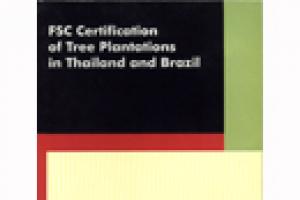Pachamama is a Quechua term, which stands, basically, for Mother Earth. The Quechua, an Indigenous People living in a large part of the Andes, believe that the Earth is a mother which cares for people as if they were her children.
The Green Economy
The Green Economy is a tactic used to “clean up” the image of corporations rather than address corporate capture and capitalism as the true drivers of deforestation. False solutions promoted under the Green Economy include certification, sustainable forest management, ecosystem services, REDD+, the bioeconomy, nature-based climate solutions, and zero net deforestation. Rather than stopping it, these “solutions” support corporate-driven destruction that is causing a deep social and ecological crisis.
Bulletin articles
12 February 2004
Other information
13 January 2004
A workshop on global environmental politics (1) brought up a number of issues and actors of relevance to forests and forest peoples: protected areas, climate change, biodiversity, the World Bank.
The different “solutions” to global environmental problems (deforestation, biodiversity loss, climate change) were contextualized as part of the approach of appropriation of nature for profit, carried out through agencies such as the World Bank, the IMF and the FAO and through entirely new mechanisms supposedly created to protect the environment.
Bulletin articles
13 December 2003
On 1 December 2003, SmartWood suspended the Forest Stewardship Council certification of two of Forest Industry Organisation’s teak plantations. SmartWood is accredited by FSC to assess whether forestry operations conform to FSC’s principles for well managed forests or plantations.
Bulletin articles
13 December 2003
The Plantar forestry company located in the State of Minas Gerais has large eucalyptus plantations in the zone, established at the expense of evicting the local populations. They were also established at the expense of the typical forest in the zone (the “cerrado”), and the trees were converted into charcoal to supply the iron and steel industry and replaced by eucalyptus, planted for the same objective.
Bulletin articles
14 November 2003
The Conference of the Parties of the United Nations Framework Convention on Climate Change will be meeting in Milan, Italy, from 1-12 December. Unfortunately, expectations from the meeting are extremely low, given that the whole process has shifted from addressing climate change to marketing carbon emissions. Money-making is what the meeting will be mostly about, unless public pressure forces government delegates to change course.
Bulletin articles
14 November 2003
The World Bank Prototype Carbon Fund’s (PCF) Plantar project has been heavily criticized by NGOs and civil society movements ever since it first emerged as the first industrial eucalyptus tree plantation to claim carbon sink credits from the Kyoto Protocol’s Clean Development Mechanism. The Plantar project involves 23,100 hectares of monoculture eucalyptus plantations for the production of charcoal, which will be used in pig iron production.
Bulletin articles
14 November 2003
The Clean Development Mechanism (CDM) of the Kyoto Protocol under the United Nations Framework Convention on Climate Change may be totally useless to address climate change, but it may prove to be good business for some parties. The assumption is that in return for investment in a project that cuts or reduces emissions in a southern country, companies will earn certified emission reductions (CERs) that industrialized countries may use to meet Kyoto Protocol commitments.
Bulletin articles
14 November 2003
The Earth Summit, a melting pot for awareness and hope
Publications
8 August 2003
By the World Rainforest Movement
Concern over the spread of tree monocultures and their certification is at the centre of this book. However, this concern is merely one part of much broader concerns concerning forests, forest peoples’ livelihoods and communities of living things.
Bulletin articles
31 July 2003
Two weeks ago, the WRM and Oilwatch disseminated an open letter to David Kaimowitz, Director of the Center for International Forestry Research (CIFOR), expressing our concern over a CIFOR research paper "which appears to give green credentials to two activities that are at the core of deforestation and forest degradation: oil and mining." (see letter at http://www.wrm.org.uy/deforestation/oil/Cifor.html )
Other information
31 July 2003
It sometimes takes many little pieces to recognize the full picture. In the case of the continued debate about the benefits or otherwise of carbon sinks projects linked to the Kyoto Protocol's Clean Development Mechanism (CDM), many still like to envisage it as the long-sought-for funding source for community-driven, small scale forest restoration projects.
Other information
31 July 2003
What's wrong with a company pursuing a green seal for 'sustainable forest management' and a climate-friendly credit for planting trees that help soak up carbon from the atmosphere? Potentially a lot, especially when both of these claims are rather dubious, as the WRM Bulletin coverage on the Brazilian company Plantar S/A indicates. And even more problematic if a company, when faced with criticism about its carbon sinks project, resorts to such tactics as the distortion of facts to discredit its critics.

